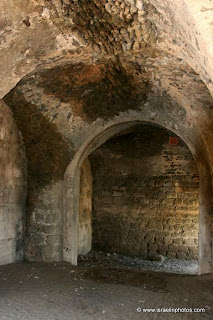Khirbet Samara sits atop a small kurkar (calcareous sandstone) hill of 28m.
The structure was build by the Samara family at the end of the 19th century above the ruins of a Roman era farm.
Abdallah Samara a Muslim (a Samaritan?) from Tul Karem (Arabic: طولكرم Ṭūlkarm; Hebrew: טול כרם), managed to get hold of the land north of the Alexander river.
The Ottoman authority used the building as a customhouse - "Gomurk" where customs duty was collected on exportation of watermelons from "Minat el-Batich", the watermelon harbor in the adjacent gulf of Mikhmoret.
The harbor was also called Minat Abu-Zbora, in the name of Aixander Abu-Zbura, a tradesman who transformed the small marina into a main export center of watermelons.
The watermelons arrived from the Sharon and the Samaria fields by camel caravans and by rafts along the Alexander River.
And from there they were send by sea mainly to Egypt.
In spring, the hill is carpeted with anemones, buttercups, and tulips.







